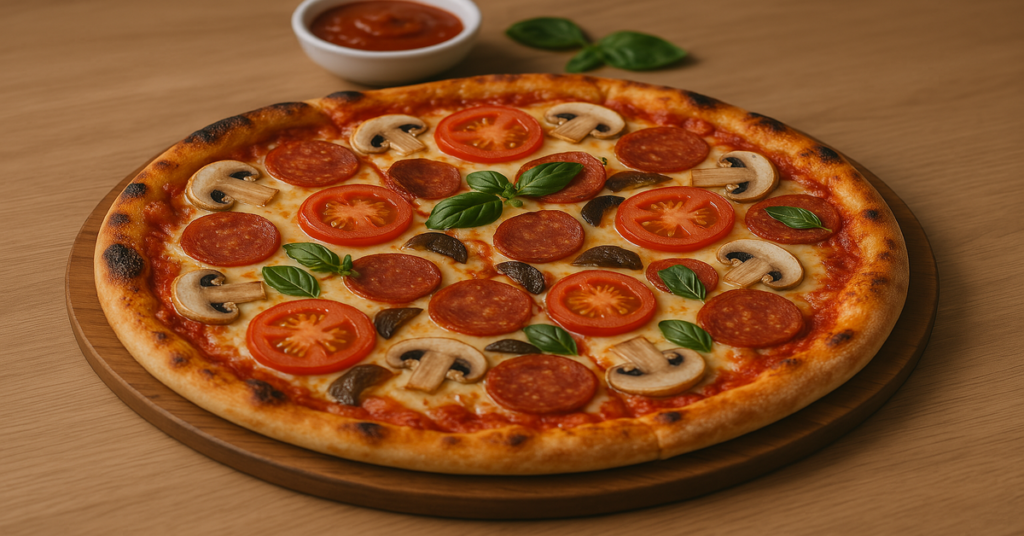Few foods have achieved global popularity quite like pizza. With its humble origins in Italy, pizza has transformed from a simple flatbread dish into a cultural and culinary phenomenon spanning continents. Whether enjoyed as fast food, gourmet cuisine, or homemade comfort food, pizza continues to evolve and adapt to regional tastes, dietary preferences, and culinary innovation. This guide—”The Pizza Edition”—offers a comprehensive look at everything pizza, from its history and ingredients to regional variations and fun facts.
The History of Pizza
Ancient Roots
Pizza’s origins date back to ancient civilizations. Flatbreads topped with herbs, oil, and sometimes cheese were common among the Egyptians, Greeks, and Romans. These early versions laid the groundwork for what we recognize as pizza today.
Birthplace: Naples, Italy
Modern pizza was born in Naples in the late 18th century. It began as a dish for the working class, sold by street vendors and topped with simple ingredients like tomatoes, garlic, cheese, and anchovies. The Margherita pizza, created in 1889 to honor Queen Margherita of Savoy, remains iconic.
Global Expansion
Pizza spread worldwide due to Italian immigration, particularly to the United States in the late 19th and early 20th centuries. Today, pizza is a staple in countries around the globe, each adding its own twist.
Core Ingredients of Pizza
Dough
The foundation of any pizza, dough can vary in thickness, flavor, and texture. Key ingredients typically include:
- Flour (usually wheat)
- Water
- Yeast
- Salt
- Olive oil
Sauce
The traditional base is tomato sauce, often seasoned with garlic, basil, oregano, and other herbs. Alternatives include:
- Pesto
- Alfredo sauce
- BBQ sauce
- Olive oil and garlic
Cheese
Mozzarella is the most widely used, but others include:
- Parmesan
- Ricotta
- Cheddar
- Goat cheese
Toppings
From classic pepperoni to exotic options like smoked salmon or truffle oil, the possibilities are endless:
- Meats: sausage, ham, bacon, prosciutto
- Vegetables: bell peppers, onions, mushrooms, olives
- Fruits: pineapple, figs
- Seafood: anchovies, shrimp
Types of Pizza Crust
Thin Crust
Popular in New York and Italian styles, this crust is light and crispy.
Thick Crust
Known for its heartiness and chewiness. Examples include Sicilian and pan pizzas.
Stuffed Crust
Filled with cheese or other ingredients, adding extra indulgence.
Gluten-Free and Alternative Crusts
Made from cauliflower, rice flour, or chickpeas for those with dietary restrictions.
Regional Styles of Pizza
Neapolitan (Italy)
- Soft, chewy crust
- Fresh mozzarella and San Marzano tomatoes
- Cooked in wood-fired ovens
New York-Style (USA)
- Large, foldable slices
- Thin, crispy base
- Often sold by the slice
Chicago Deep Dish (USA)
- Thick, buttery crust
- Layers of cheese, toppings, and chunky tomato sauce
Detroit-Style (USA)
- Rectangular shape
- Crispy, cheesy edges
- Thick but airy crust
California-Style (USA)
- Gourmet toppings
- Focus on freshness and organic ingredients
Japanese Okonomiyaki
- Pizza-like pancake
- Includes cabbage, meat, and sauces
Making Pizza at Home
Equipment Needed
- Pizza stone or steel
- Oven (standard or wood-fired)
- Pizza peel
- Rolling pin or hands for stretching dough
Step-by-Step Dough Recipe
- Mix flour, yeast, salt, and water
- Knead the dough until elastic
- Let it rise for 1–2 hours
- Divide and shape the dough
- Add toppings and bake at 475°F (245°C) for 10–15 minutes
Tips for Perfect Pizza
- Preheat your oven for at least 30 minutes
- Use a hot surface to bake the pizza
- Don’t overload with toppings
- Use fresh, high-quality ingredients
Pizza in Popular Culture
Movies and TV
The Pizza Edition frequently appears in pop culture—from the Ninja Turtles’ love for it to iconic scenes in films like “Home Alone.”
Music and Art
Numerous songs, memes, and artworks celebrate the pizza lifestyle, often depicting it as the ultimate comfort food.
Social Media Influence
Instagram and TikTok have popularized unique pizza creations, with influencers and chefs sharing everything from rainbow cheese pulls to dessert pizzas.
Health and Nutrition
Nutritional Breakdown
The Pizza Edition can be part of a balanced diet when made with fresh, nutritious ingredients. However, commercial pizzas may be high in sodium and fat.
Healthier Options
- Whole-wheat or cauliflower crusts
- Reduced-fat cheese
- Lean proteins and fresh vegetables
- Moderate portion sizes
Dietary Variations
- Vegan pizza: dairy-free cheese, no meat
- Gluten-free pizza: alternative flours
- Keto pizza: cheese-based crusts or almond flour
The Business of Pizza
Global Industry Stats
- Valued at over $150 billion globally
- Dominated by brands like Domino’s, Pizza Hut, Papa John’s
- Rising popularity of artisan and delivery-only pizza kitchens
Local Pizzerias vs. Chains
- Local: focus on quality and unique recipes
- Chains: consistency, convenience, marketing reach
Trends in Pizza
- Plant-based toppings
- Sustainable packaging
- Use of robotics and AI in kitchens
Fun Facts and Trivia
- The world’s largest pizza was over 13,000 square feet
- Americans eat approximately 100 acres of pizza every day
- October is National Pizza Month in the USA
- The most expensive pizza costs over $12,000 and includes caviar and gold leaf
Pizza Events and Festivals
- Pizza Expo (Las Vegas): for industry professionals
- Napoli Pizza Village (Italy): massive celebration of Neapolitan pizza
- Pizza & Beer Fests: held in many U.S. cities
How to Pair Pizza with Drinks
Beverages That Complement Pizza
- Beer: lagers and IPAs for meat pizzas; wheat beers for veggie pies
- Wine: Chianti with Margherita, Syrah with sausage
- Non-alcoholic: sparkling water, soda, lemonade
Pizza Tasting Events
Hosting a pizza party with various styles and beverages can be a fun and educational experience.
The Future of Pizza
Innovation in Ingredients
- Lab-grown meats
- Edible packaging
- Insect-based protein toppings (yes, it’s a thing!)
Tech and Pizza
- AI-generated flavor combinations
- Automated pizza-making robots
- Drones for delivery
Sustainability
- Focus on organic and local ingredients
- Reducing food waste in pizza preparation
- Eco-friendly delivery methods
Conclusion
The Pizza Edition is more than just a food; it’s a cultural icon, a culinary playground, and a beloved staple around the world. From its rich history to the latest innovations, pizza continues to bring people together across generations and borders. Whether you’re baking it at home, grabbing a slice from your favorite pizzeria, or trying a gourmet variation in a trendy restaurant, pizza offers something for everyone.
“The Pizza Edition” is a celebration of this timeless dish. As pizza continues to evolve, one thing remains certain: its ability to adapt, satisfy, and unite will never go out of style.
FAQs
1. What is the origin of modern pizza?
Modern pizza originated in Naples, Italy, in the 18th century as a dish for the working class.
2. What’s the most popular pizza topping worldwide?
Pepperoni is the most popular topping in the United States, while preferences vary globally, with toppings like tuna or corn favored elsewhere.
3. Can pizza be healthy?
Yes, when made with whole grains, lean proteins, and plenty of vegetables, pizza can be part of a balanced diet.
4. What are some alternatives to traditional pizza crusts?
Options include cauliflower, almond flour, whole wheat, and cheese-based crusts for gluten-free or keto-friendly diets.
5. Why is Neapolitan pizza cooked in wood-fired ovens?
Wood-fired ovens reach very high temperatures, creating a soft, charred crust that’s essential to authentic Neapolitan pizza.
6. Is pizza considered fast food or gourmet?
Pizza spans both categories—it can be a quick meal or a sophisticated dish, depending on the ingredients and preparation style.






